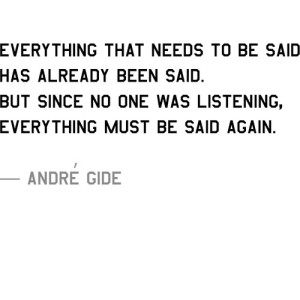 Communication feels like air, water and food to us. We communicate naturally and with abundance. The Internet turned communication into a buffet of ideas that we can all gorge on at any given moment, for better or for worse. How do we avoid empty information calories and excessive vicarious emotions that stimulate the brain but provide no meaningful outlet for the cultivated opinions and responses? How do we encourage communication that makes a difference and gets results?
Communication feels like air, water and food to us. We communicate naturally and with abundance. The Internet turned communication into a buffet of ideas that we can all gorge on at any given moment, for better or for worse. How do we avoid empty information calories and excessive vicarious emotions that stimulate the brain but provide no meaningful outlet for the cultivated opinions and responses? How do we encourage communication that makes a difference and gets results?
Perhaps, taking responsibility for what we consume and share online and reflect on its usefulness and meaning can be a step in the right direction. A healthy diet for your mind is as important as a healthy diet for your body. In the words of Lama Surya Das, “If we want to simplify and deepen our lives, we must simplify and deepen our minds. When we become more centered, clear, spacious, caring, and open, there is suddenly much more room in our frenetic lives for both others and ourselves.”
Here are 12 coaching questions to explore if you want to become more aware of your online communication style and make it more effective and productive:
- What is the intent behind your communication: to inform, entertain, support, motivate, inspire, reflect, understand, connect, persuade, distract, misrepresent, annoy, aggravate, vent, deflect, etc.? The intent is rarely stated but often assumed when we communicate online. You may never know what motivates other people to say certain things, but you should be clear about your own intent.
- How do you want to be perceived when you communicate online?
- What issues are appropriate for an email, a private message or a post and what topics are better handled via a face-to-face conversation or a phone call? If an important issue is likely to become explosive online, at what point do you pick up the phone?
- How can your words be interpreted differently from what you intended?
- How can you interpret what you read or hear differently?
- How can you ascribe a neutral or positive intent even when you receive a seemingly negative message?
- What needs to be clarified?
- If you are having an online argument with someone and that person walks into the room, what would you say face to face?
- What would you write if you were angry? What would be the benefits, costs and consequences of sending an angry message?
- What would you write if you were calm and composed? What would be the benefits, costs and consequences of sending a balanced message?
- How can you make your communication factual, positive, direct, precise and concise?
- What do you want to communicate about HOW the issues are communicated? What suggestions do you have to improve communication and avoid misunderstandings?

Leave A Comment
You must be logged in to post a comment.